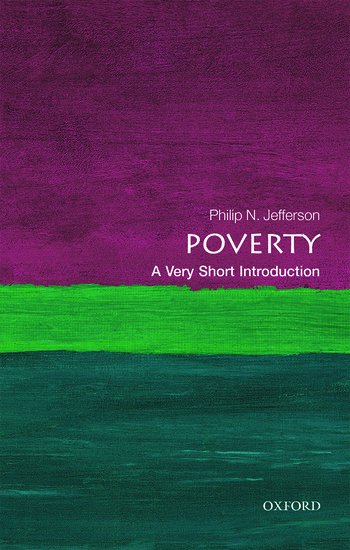A Very Short Introduction | Social Science
Poverty
ISBN: 9780198716471
Series: A Very Short Introduction
Poverty (Social Science)
A Very Short Introduction Poverty (Social Science) Media > Books > Non-Fiction > Education Books Expect Delays of Up to 4 Weeks| Order Below |
ISBN
9780198716471 (10-digit ISBN: 0198716478)
- Description
- Key Features
- Series Description
- Table of Contents
- Considers who the poor are, where they live, what their lives are like, and the obstacles or barriers they face.
- Examines the practical and analytical efforts which have been made to eradicate poverty and discusses what progress has been made in the past, and what we can do in the future.
- Looks at what social, economic, and political constructs or institutions influence the poor.
No one wants to live in poverty. Few people would want others to do so. Yet, millions of people worldwide live in poverty. According to the World Bank, over 700 million people lived on less than US $2 a day in 2013. Why is that? What has been done about it in the past? And what is being done about it now?In this Very Short Introduction Philip N. Jefferson explores how the answers to these questions lie in the social, political, economic, educational, and technological processes that impact all of us throughout our lives. The degree of vulnerability is all that differentiates us. He shows how a person's level of vulnerability to adverse changes in their life is very much dependent on the circumstances of their birth, including where their family lived, the schools they attended, whether it was peacetime or wartime, whether they had access to clean water, and whether they are male or female. Arguing that whilst poverty is ancient and enduring, the conversation about it is always new and evolving, Jefferson looks at the history of poverty, and the practical and analytical efforts we have made to eradicate it, and the prospects for further poverty alleviation in the future.
Oxford's Very Short Introductions series offers concise and original introductions to a wide range of subjects--from Islam to Sociology, Politics to Classics, Literary Theory to History, and Archaeology to the Bible.
Not simply a textbook of definitions, each volume in this series provides trenchant and provocative--yet always balanced and complete--discussions of the central issues in a given discipline or field. Every Very Short Introduction gives a readable evolution of the subject in question, demonstrating how the subject has developed and how it has influenced society. Eventually, the series will encompass every major academic discipline, offering all students an accessible and abundant reference library.
Whatever the area of study that one deems important or appealing, whatever the topic that fascinates the general reader, the Very Short Introductions series has a handy and affordable guide that will likely prove indispensable.
Please note: As this series is not ELT material, these titles are not subject to discount.
Acknowledgements
List of figures
List of abbreviations
1: Introduction
2: History
3: Measurement
4: Living: here and there
5: Labour markets
6: Distribution and mobility
7: Combating poverty
8: Whither poverty?
Further reading
Index
No one wants to live in poverty. Few people would want others to do so. Yet, millions of people worldwide live in poverty. According to the World Bank, over 700 million people lived on less than US $2 a day in 2013. Why is that? What has been done about it in the past? And what is being done about it now?In this Very Short Introduction Philip N. Jefferson explores how the answers to these questions lie in the social, political, economic, educational, and technological processes that impact all of us throughout our lives. The degree of vulnerability is all that differentiates us. He shows how a person's level of vulnerability to adverse changes in their life is very much dependent on the circumstances of their birth, including where their family lived, the schools they attended, whether it was peacetime or wartime, whether they had access to clean water, and whether they are male or female. Arguing that whilst poverty is ancient and enduring, the conversation about it is always new and evolving, Jefferson looks at the history of poverty, and the practical and analytical efforts we have made to eradicate it, and the prospects for further poverty alleviation in the future.
Key Features
- Considers who the poor are, where they live, what their lives are like, and the obstacles or barriers they face.
- Examines the practical and analytical efforts which have been made to eradicate poverty and discusses what progress has been made in the past, and what we can do in the future.
- Looks at what social, economic, and political constructs or institutions influence the poor.
Series Description
Oxford's Very Short Introductions series offers concise and original introductions to a wide range of subjects--from Islam to Sociology, Politics to Classics, Literary Theory to History, and Archaeology to the Bible.
Not simply a textbook of definitions, each volume in this series provides trenchant and provocative--yet always balanced and complete--discussions of the central issues in a given discipline or field. Every Very Short Introduction gives a readable evolution of the subject in question, demonstrating how the subject has developed and how it has influenced society. Eventually, the series will encompass every major academic discipline, offering all students an accessible and abundant reference library.
Whatever the area of study that one deems important or appealing, whatever the topic that fascinates the general reader, the Very Short Introductions series has a handy and affordable guide that will likely prove indispensable.
Please note: As this series is not ELT material, these titles are not subject to discount.
EASY ORDER FORM
PRICES LISTED INCLUDE CONSUMPTION TAX
Price Before Tax:
¥1,790


